In recent years, June has been the month we’ve heard the winner of the winner of the Miles Franklin Award. However, this year the announcement has been scheduled for August so we’ll all just have to wait. However, we did have, this month, the announcement of the shortlists for the Kibble and Dobbie Literary Awards for life writing. All books have been reviewed for our challenge, which is a great achievement. The shortlists are:
- Kibble Literary Award: A few days in the country: and other stories by Elizabeth Harrower; Second half first by Drusilla Modjeska; Small acts of disappearance by Fiona Wright
- Dobbie Literary Award for a first time published author: Rush Oh! by Shirley Barrett; Reckoning: A memoir by Magda Szubanski; Salt Creek by Lucy Treloar
June’s highlights
Thirty-three reviews were posted this month, which is a perfectly respectable number! Thanks all. Highlights are:
- Reviews were evenly spread across authors this month, but three authors were reviewed twice – Helen Garner, Olga Lorenzo, Charlotte Wood – and all of these were for their most recent books.
- Top reviewers were Anna (at Goodreads) and yours truly (Whispering Gums), with three reviews each.
- A quarter of the reviews published this month were for non-fiction books, including memoirs, of course, but the rest comprise quite a varied bunch!
The Classics
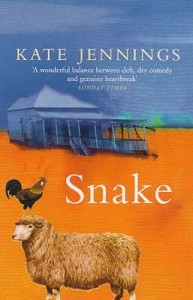 Just one classic was reviewed this month, Kate Jennings’ 1986 novella, Snake. It was reviewed by Kim Forester (Reading Matters). It’s autobiographical fiction, and Kim loved it, as I did when I read it a couple of years ago. She writes:
Just one classic was reviewed this month, Kate Jennings’ 1986 novella, Snake. It was reviewed by Kim Forester (Reading Matters). It’s autobiographical fiction, and Kim loved it, as I did when I read it a couple of years ago. She writes:
In its examination of lives sullied by disappointment, contempt and regret, Snake is a commanding novel: one that will leave an impact. And despite its flat, matter-of-fact prose style, the narrative reads like a series of hypnotic poems brimful of acute observations and eloquent language.
Crime
Genre books can also be “literary”, as I’m sure you all know! This means that genre books can and do appear in my list as well as in the lists of AWW Team members responsible for the various genre groups (and so can also turn up in more than one round-up!). Occasionally I’ve featured one of our genre here in my round-ups, but I’m not sure when I last featured Crime. However, several crime books were flagged as literary this month so now seemed a good time to shine a light on them!
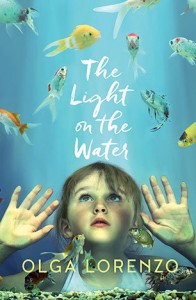 Of the five crime-tagged reviews this month, two were for Olga Lorenzo’s novel, The light on the water. It tells the story of a woman, a mother, in jail for killing (though did she?) her daughter who disappeared on a hike. Bernadette (Reactions to Reading) says that while there is some resolution to the “crime” (or is it?), that’s not what the book is really about:
Of the five crime-tagged reviews this month, two were for Olga Lorenzo’s novel, The light on the water. It tells the story of a woman, a mother, in jail for killing (though did she?) her daughter who disappeared on a hike. Bernadette (Reactions to Reading) says that while there is some resolution to the “crime” (or is it?), that’s not what the book is really about:
It’s about Anne. It is an exploration of her life. An exploration of that notion that Lorenzo has introduced early on – how did a ‘good’ life turn so horribly wrong?
Aa a result, Bernadette says, it’s a more character-driven novel, rather than a fast-paced plot-driven one. Anna (at GoodReads) felt similarly. She also found the book:
well-written, with evocative language that never becomes intrusive. I have seen some reviews that criticise the ending of the book, but I found it to be plausible and satisfying.
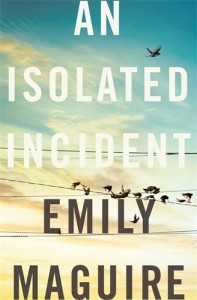 Linda Funnell reviewed Emily Maguire’s An isolated incident for the Newtown Review of Books. It’s about the murder of a young aged-care worker. Like Lorenzon’s book above it seems, the crime is not the prime interest of this book. Funnell writes:
Linda Funnell reviewed Emily Maguire’s An isolated incident for the Newtown Review of Books. It’s about the murder of a young aged-care worker. Like Lorenzon’s book above it seems, the crime is not the prime interest of this book. Funnell writes:
This is far more than a page-turning crime drama, though it is also that. Maguire’s focus is on those left behind, the often unacknowledged victims of violent crimes, and roiling beneath it all is a bigger picture of accepted, commonplace and insidious attitudes to women. We do find out whodunnit in the end, but in this context it’s almost a footnote.
The other crime novels reviewed this month were Helen Fitzgerald’s Viral (by Emily Witt) and Anna Westbrook’s Dark fires shall burn (by Karen Chisholm)
Non-fiction
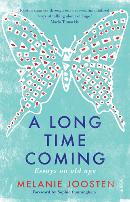 One of this month’s non-fiction books, Melanie Joosten’s A long time coming: Essays on old age, was reviewed by Shelley McInnes for the Newtown Review of Books. The essays draw from Joosten’s interviews with nursing home residents from Bathurst Island to Melbourne’s CBD, but she “interweaves [these voices] with pertinent facts, as well as snippets of information about her own life”. She also talks about:
One of this month’s non-fiction books, Melanie Joosten’s A long time coming: Essays on old age, was reviewed by Shelley McInnes for the Newtown Review of Books. The essays draw from Joosten’s interviews with nursing home residents from Bathurst Island to Melbourne’s CBD, but she “interweaves [these voices] with pertinent facts, as well as snippets of information about her own life”. She also talks about:
how the media frames feminist issues around the concerns of younger women, and how even to younger feminists the interests of older women appear to be invisible. Germaine Greer, Susan Sontag, Simone de Beauvoir, Betty Friedan, Gloria Steinem and others have recorded their experiences of ageing, Joosten notes, but where, she asks, are the women prepared to take up their cause?
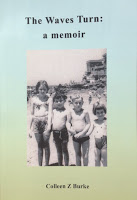 Good question, though it sounds like Joosten is doing her best.
Good question, though it sounds like Joosten is doing her best.
Amongst the memoirs reviewed in June was poet Colleen Z Burke’s The waves turn: A memoir. Jeanette Delamoir writing forThe Newtown Review of Books sees it as more than a memoir because of the breadth of Burke’s story:
The era includes the restrictions of the Menzies years and the social revolutions of the 1960s and 70s – cultural changes to which she was close, through her participation in the fringes of Sydney’s Push, involvement in Australia’s folk music scene (including her marriage to prominent musician Declan Affley), and activism on multiple fronts. Burke’s life becomes a valuable lens though which to explore the intertwined histories of folk music, Irish heritage, and political activism, traversing themes such as class, religion, gender relations, and personal commitment.
It is clearly an action-packed memoir that tries to cover a lot. Delamoir concludes by describing it as “a self-portrait that holds the reader at a distance while feeling paradoxically intimate”.
A fascinating and diverse collection of reviews this month, and I’ve only been able to mention a few of them. No wonder I enjoy being part of this challenge.
———————
About Me
I am Whispering Gums and I read, review and blog about (mostly) literary fiction. It was reading Jane Austen when I was 14 years old that turned me on to reading literary fiction/classics, which is why I am here today doing this round-up! Little did Jane know what she started!
My love of Aussie literature started with Banjo Paterson’s ballads and Ethel Turner’s Seven Little Australians in my childhood. But, I didn’t really discover Australian women’s writing until the 1980s when I “met” and fell in love with Elizabeth Jolley, Thea Astley, Olga Masters, Helen Garner and Kate Grenville. Ever since then I have been making sure to include a good percentage of Australian (and other) women writers in my reading diet.






Your round-ups always make me realise how many more books I could add to my TBR list if I let myself go crazy!
I was delighted with the winning choices for the Dobbie & Kibble, and wonder if we will see any Aussie women on the forthcoming Booker longlist.
Wouldn’t that be great Brona. I wonder if Wood will be there? It will be interesting to see.
It’s a tricky business isn’t it defining what is literary and what is not. Here’s the best definition I’ve found so far:
http://writerunboxed.com/2016/06/01/what-makes-fiction-literary-scenes-versus-postcards/